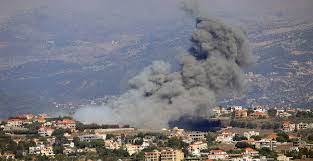
In light of the escalating violence between Israel and Hezbollah, the United States and its allies have jointly called for a 21-day ceasefire along the Israel-Lebanon border, effective immediately. This proposal, backed by a coalition of 12 nations including the UK, EU, and several Arab states, comes as over 600 people have been killed and nearly 500,000 displaced in Lebanon since the onset of Israeli airstrikes on Monday.
The urgent plea for a pause in hostilities was articulated in a statement issued by President Joe Biden and French President Emmanuel Macron. The leaders emphasized the necessity for safety and security, urging both Israel and Lebanon to agree to the temporary cessation of fighting. “The exchange of fire since October 7th, and particularly in the past two weeks, poses a threat of broader conflict and jeopardizes civilian safety,” they stated. The ceasefire is intended to facilitate diplomatic efforts and enable civilians to safely return to their homes.
The call for a ceasefire follows statements from Israel’s military chief, Lt Gen Herzi Halevi, who indicated that extensive airstrikes against Hezbollah could result in Israeli forces entering Lebanese territory. The joint statement from the US and its allies highlighted the ongoing hostilities as a significant risk for regional escalations.
Despite the international demand for a ceasefire, official reactions from the Israeli and Lebanese governments remain pending. A senior US official noted that negotiations are in progress with the Lebanese government, emphasizing the need for state leadership in managing non-state actors like Hezbollah.
UN Secretary-General Antonio Guterres also joined the call for an immediate ceasefire, expressing concerns over the dire situation in Lebanon. He described the circumstances as “hell breaking loose.”
Lebanon’s Prime Minister, Najib Mikati, condemned the Israeli airstrikes, characterizing them as violations of Lebanese sovereignty. He expressed hope that international pressure would compel Israel to agree to the ceasefire, stating, “We are facing blatant violations of our sovereignty and human rights.”
In response to the conflict, Israel’s UN envoy, Danny Danon, reaffirmed that Israel does not seek a full-scale war but is committed to defending its citizens through all means available, in compliance with international laws.
Amid these developments, cross-border attacks have persisted, with Hezbollah targeting Israeli military and intelligence facilities. Iran, a key supporter of Hezbollah, condemned the Israeli airstrikes, warning of a potential “full-scale catastrophe” in the Middle East. Tehran pledged to assist Lebanon through “all means necessary” should Israel escalate its military actions.
The international community watches closely as diplomatic efforts unfold, hoping to restore stability and protect civilians in the region.
Sources By Agencies


